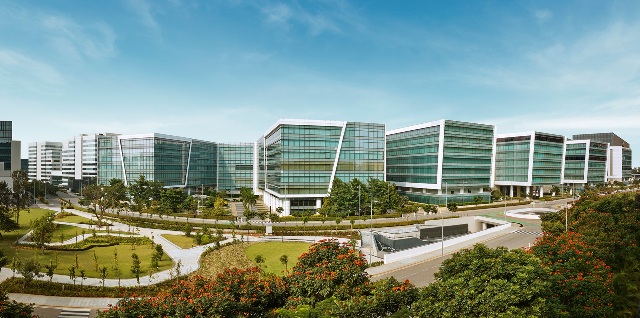Commercial realty: GCCs and economic stability fuelling growth
India's commercial real estate sector is on a remarkable growth trajectory, driven by economic stability and strong investor confidence. A significant contributor to this expansion is the rise of Global Capability Centres (GCCs), which have transformed from cost-saving hubs to strategic assets, playing a crucial role in India's burgeoning real estate landscape. This article delves into the evolution of GCCs, their impact on commercial real estate, and the broader factors driving demand for office spaces across India
The commercial real estate in India is on a growth trajectory fuelled by economic stability and investor confidence. The India Commercial Real Estate Market size is estimated at USD 40.71 billion in 2024, and is expected to reach USD 106.05 billion by 2029, growing at a CAGR of 21.10% during the forecast period (2024-2029). According to a report by KPMG, the commercial segment is expected to continue growing as India remains a favourable investment option amidst rising geopolitical tensions. The demand growth will be mainly driven by tech-enabled sectors expanding their operations in the country. The growth in India’s commercial real estate is largely driven by Global Capability Centres (GCC). In the past two decades, the Global Capability Centre (GCC) landscape in India has undergone a remarkable transformation. Initially, established as cost-saving centers for multinational companies, GCCs have now evolved into strategic assets, playing a crucial role in driving innovation, digital transformation, and business growth."
GCC genesis and growth
The genesis of Global Capability Centres (GCCs) in India traces back to the early 1990s, coinciding with India's economic liberalisation and the rise of globalisation. Beginning with Texas Instruments in 1985, which established its office in Bengaluru, India has made significant strides to become the epicenter of Global Capability Center (GCC) growth. The 1990s marked a significant shift as multinational companies (MNCs) began recognising India's potential as a hub for cost-effective business operations, particularly in IT and back-office functions. Previously referred to as "captive centers," these operations are now commonly known as Global In-House Centers (GICs) or Global Capability Centers (GCCs). The initial wave of GCCs in India concentrated primarily on IT services, software development, and business process outsourcing (BPO). Pioneering companies like GE, American Express, and Citibank were among the first to establish captive centers in cities such as Bangalore, Hyderabad, and Pune. The growth of these centers was further bolstered by the Indian government's supportive policies, including the creation of Software Technology Parks (STPs) and Special Economic Zones (SEZs).
According to NASSCOM, the number of GCCs in India grew from around 500 in the early 2000s to over 1,400 by 2010. In 2012, approximately 760 GCCs were operating in India. By 2016, that number had surpassed 1,000, and as of March 2023, India is home to over 1,600 GCCs. According to a report by Wizmatic, GCCs presently employ 32 lakh people, primarily engineers and scientists. They generated a combined revenue of $46 billion in 2023 and are estimated to generate a total revenue of $121 billion by 2030, roughly 3.5 billion of India’s GDP. Out of this, $102 billion will represent export earnings. According to a joint report by CBRE and Zyoin, the GCC workforce in India is expected to reach 2 million by 2025, with over 200,000 job openings across industry sectors. To accommodate growth, GCCs are seeking both conventional and flexible office spaces, with a preference for high-quality, tech-enabled workspaces and large-scale campus developments. According to Ernst and Young estimates, it is expected that by the end of 2024, the total revenue generated by all GCCs operating in India will be around USD 46 billion.
According to Colliers' latest report, titled "Global Capability Centers in India: A newfound wave of confidence", over the next two years, Global Capability Centers (GCCs) are expected to lease about 45-50 million square feet of office space, accounting for approximately 40 percent of the total office demand across the top 6 cities (Bengaluru, Hyderabad, Chennai, Pune, Mumbai and Delhi-NCR). Improved business sentiments and positive economic outlook is fostering heightened demand of office spaces in India, particularly signaling confidence among foreign origin companies seeking to establish their capability centers in the country. Interestingly, despite a weaker global outlook amidst pandemic and geopolitical tensions in the last 2-3 years, GCCs resumed their expansions in a steadfast manner, registering a 14% YoY rise in leasing activity in 2023. The second half of 2023 particularly witnessed the highest GCC leasing activity since 2020, reaching 12.4 million square feet. The report also highlighted, since 2020, GCCs have leased about 72 million sq ft of office space across the top 6 cities in India, accounting for 39 percent of the total office demand during the period. US-origin GCCs, primarily belonging to Tech and BFSI sectors, dominated this demand with 71 percent share, followed by EU-based GCCs. APAC-based Tech and Engineering & manufacturing firms too have gradually started establishing their GCCs in the country, registering notable 8X YoY rise in 2023. Southern cities like Bengaluru, Hyderabad, and Chennai have become key GCC hubs, with Bengaluru and Hyderabad together leading GCC leasing activity at a cumulative share of 60 percent from 2020 to 2023. Chennai saw a notable 2.4X surge in 2023, while Pune and Mumbai witnessed over 1.7X growth compared to 2022.
According to Knight Frank India & 3AI GCC India report 2024, Bengaluru leads the GCC tally and is the top choice for platform engineering. With Hyderabad and Delhi emerging as key contenders due to the flourishing of new IT hubs, Tier-2 cities also saw an increase in the overall movement. Chennai and Pune dominated primarily in automotive GCCs and Mumbai emerged as the top choice for BFSI GCCs. On the talent front, Bengaluru leads the tally with the highest percentage of around 37% of GCC talent located in the city followed by 15% in Delhi and 12 percent each in Hyderabad and Pune respectively. In terms of total area occupied by GCCs in sq ft, Bengaluru has the highest occupancy throughout the period from 2018 and 2023. Ahmedabad and Kolkata on the other hand, were the two cities which saw the lowest occupancy in sq ft between 2018 and 2023.
Surge in demand for office space
Post-pandemic, India has experienced exponential growth in office space demand. This surge has been driven by a swift economic rebound, which outpaced that of many other economies. The government actively facilitated this growth by easing policy norms and permitting 100% foreign direct investment (FDI) in the real estate sector. Additionally, various tax incentives were introduced to encourage businesses to set up operations in India. Real estate developers responded by offering Grade A office spaces at competitive leasing rates, often with long-term lease options, further fueling this expansion. According to a report by JLL India, driven by strong leasing activity, Q2 (April-May-June) was the first time when all top seven cities (Mumbai, Delhi NCR, Bengaluru, Chennai, Kolkata, Pune, and Hyderabad) recorded gross leasing volumes of at least 1 million square feet. The second quarter gross leasing was up 21.3 percent QoQ and was recorded at 18.38 million square feet. The last four consecutive (Q22024, Q12024, Q42023 and Q32023) quarters have now exceeded the 15 million square feet mark in gross leasing volumes, underpinning the strong momentum in the office market. Furthermore, H1 2024 (January to June) marked the best-ever first half, with leasing volumes at 33.5 million sq. ft, surpassing the previous highest H1 performance seen in 2019. Bengaluru led the charge, accounting for a 33 percent share of the quarterly gross leasing, followed by Delhi NCR with a 20.7 percent share. Hyderabad and Mumbai also recorded strong leasing activity with respective shares of 13.1 percent and 12.2 percent. “In Q2, global occupiers accounted for a significant 59.3% share of gross leasing volumes. Nevertheless, domestic occupiers continue to show strong momentum, representing a 48.4% share of India’s gross leasing activity since 2022,” said Dr. Samantak Das, Chief Economist and Head of Research and REIS, India, JLL.
According to Colliers’ report, Office market continued its strong performancein Q2 2024, registering 15.8 million square feet of office leasing across the top 6 cities,marking a notable16 percent rise over previous quarter. 4 out of 6 cities saw more than 20 percent increase in office leasing in the second quarter on a sequential basis, signaling robust occupier confidence and market sentiment.Bengaluru and Mumbailed the office demandin Q2 2024, cumulatively accounting formore than half of India’s leasing activity.Office space demand in these two cities were driven by occupiers from diverse sectors such as BFSI,Technology and Engineering & Manufacturing. During Q2 2024, new supply across the top 6 cities surged 6 percent YoY, at13.2 million square feet. Mumbai accounted for 30 percent share in new supply, followed by Hyderabad at 27 percent share. Interestingly, on account of few prominent projects receiving completion certificates in Mumbai, new supply in Q2 2024 stood at 4.0 million square feet, the highest incremental quarterly supply in the past 3-4 years. Technology and Engineering & Manufacturing remained the front runners during Q2 2024, accounting for almost half of the total demand during the quarter. Flex spaces also saw healthy leasing of 2.6 million square feet across the top 6 cities,highest in any quarter. Bengaluru and Delhi-NCR accounted for 65 percent of the flex space leasing activity, indicating rising demand for such spaces in these markets.
Office occupiers in India are displaying an increased preference for an “office-first” approach, resulting in higher workplace utilisation rates and re-evaluation of leasing and portfolio strategies to accommodate their growth plans, says a report by CBRE. The data provided by the report highlights the office leasing activity in India increased by 21 percent QoQ to touch 18 million square feet in Q2 2024. Bengaluru, followed by Pune and Chennai, accounted for a share of 57 percent in the overall transaction activity reported during the quarter. The absorption grew by 14 percent Y-o-Y to about 32.8 million square feet in H1 2024. New supply increased by 49 percent QoQ and 11 percent YoY to reach 13.2 million square feet in Q2 2024. Bengaluru, Mumbai, and Hyderabad led supply additions during the quarter, accounting for a cumulative share of 69 percent. During the second quarter, US-based multinationals became more active as they led quarterly absorption, accounting for a share of 39 percent. However, domestic firms dominated H1 2024 leasing with a share of 43 percent. With a continued emphasis on sustainability from developers and occupiers alike, more than three-fourths of the newly completed office space during Q2 2024 was green certified.
Demand to increase
The global economy is showing signs of strain, as escalating geopolitical tensions heighten uncertainty pose significant risks to global stability and economic growth. The Russia-Ukraine war rages on and the Israel-Palestine conflict has intensified, now drawing Iran into the fray. These developments have caused economic growth in many European countries to decline. In contrast, India’s economy remains robust, with a long-term outlook for political stability. This favorable environment is prompting leading corporations to establish offices in India, attracted by the country's skilled workforce and abundance of Grade A office spaces. To further entice these international companies, India has implemented favorable policies aimed at attracting investors.
The growth momentum of the country's commercial real estate will continue to be fueled by GCCs, with both existing centers expanding their presence and new ones entering the market across various sectors. The growth is office space will be further fuelled by highly skilled workforce, especially in the tech industry, the strategic expansion into tier-2 cities as satellite hubs, favorable government initiatives, and upgraded infrastructure.
India's commercial real estate sector is poised for sustained growth, underpinned by the expansion of Global Capability Centres and a favorable economic environment. As multinational companies continue to establish and expand their GCCs in the country, the demand for high-quality office spaces is expected to surge, particularly in key cities like Bengaluru, Hyderabad, and Chennai. The government's supportive policies and the nation's skilled workforce further bolster India's position as a prime destination for commercial real estate investment. Looking ahead, the sector is set to continue its upward trajectory, solidifying India's status as a global hub for business operations.
















